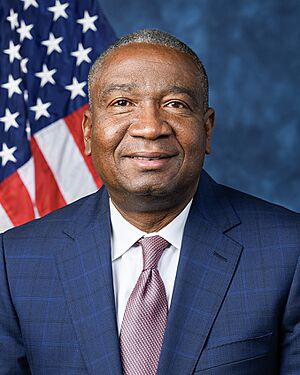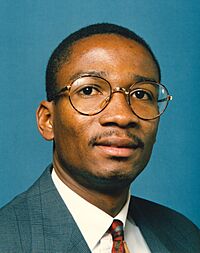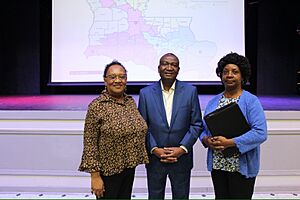Cleo Fields facts for kids
Quick facts for kids
Cleo Fields
|
|
|---|---|

Official portrait, 2024
|
|
| Member of the U.S. House of Representatives from Louisiana |
|
| Assumed office January 3, 2025 |
|
| Preceded by | Garret Graves (redistricted) |
| Constituency | 6th district |
| In office January 3, 1993 – January 3, 1997 |
|
| Preceded by | Jim McCrery (redistricted) |
| Succeeded by | John Cooksey (redistricted) |
| Constituency | 4th district |
| Member of the Louisiana Senate from the 14th district |
|
| In office January 13, 2020 – January 3, 2025 |
|
| Preceded by | Yvonne Dorsey-Colomb |
| Succeeded by | Larry Selders |
| In office December 1997 – January 2008 |
|
| Preceded by | John Michael Guidry |
| Succeeded by | Yvonne Dorsey-Colomb |
| In office March 1988 – January 3, 1993 |
|
| Preceded by | Richard Turnley |
| Succeeded by | John Guidry |
| Personal details | |
| Born | November 22, 1962 Port Allen, Louisiana, U.S. |
| Political party | Democratic |
| Spouse | Debra Horton |
| Children | 2 |
| Education | Southern University (BA, JD) |
| Website | |
Cleo C. Fields, born on November 22, 1962, is an American lawyer and politician. He currently serves in the United States House of Representatives, representing Louisiana's 6th district. He previously represented Louisiana's 4th district from 1993 to 1997. Fields also ran for governor of Louisiana in 1995. He has served as a member of the Louisiana State Senate three different times. Fields is a member of the Democratic Party.
Fields was born in Port Allen, Louisiana. He earned his college and law degrees from Southern University in Baton Rouge. In 1987, he was elected to the Louisiana Senate. He ran for Congress in 1990 but was not elected. He was re-elected to the State Senate for the 14th district in 1991.
Fields was elected to the House of Representatives in 1992 and again in 1994. He ran for governor in 1995 but lost to Mike Foster. He did not run for re-election to the House in 1996. Fields was elected to the State Senate again in 1997 and 2003. In 2007, a court ruled he could not run for re-election due to term limits. He was elected to the State Senate seat again in 2019.
On January 23, 2024, Fields announced he would run for Congress again. This happened after new district maps were created for Louisiana. He won the election in November 2024. He was sworn into the House of Representatives on January 3, 2025, after being away for 28 years.
Contents
Early Life and Education
Fields was born in Port Allen, Louisiana. He was the seventh of ten children. His father, a dock worker, passed away when Fields was four years old. His mother, Alice, then moved the family to South Baton Rouge.
Fields attended Southern University. He earned a Bachelor of Arts degree and a Juris Doctor, which is a law degree.
Political Career
While still in law school, Fields started his first campaign for the Louisiana State Senate. He did much of the work himself. He even wrote his own jingles for radio ads. Fields built support among college students. He ran against Richard Turnley, who had been in office for a long time. Fields surprised many by winning the election.
Serving in the U.S. House of Representatives
Fields served in the state Senate for six years. In 1990, he ran for the 8th District in the U.S. House. He was defeated in the first round.
He ran again in 1992. This time, he ran in the new 4th District. This district was designed to have a majority of Black voters. Fields finished first in a primary election with many candidates. He then won a runoff election. At 30 years old, he was again the youngest lawmaker. He worked on important issues in Congress. He served on committees like the House Small Business Committee. He also served on the House Banking, Finance, and Urban Affairs Committee.
Fields was known for his liberal views in Congress. He supported policies that helped education. He also worked to protect consumers from banks and insurance companies. Congressional Quarterly noted that Fields tried to help small businesses in his district. His district had high poverty rates. Even though he had strong political views, he was well-liked by his colleagues.
Fields' district was created to include more Black voters. After some legal challenges, the district was redrawn. Fields won his election in 1994. However, the Supreme Court later ruled that the district was unconstitutional. His home in Baton Rouge was then placed in a different district.
Running for Governor in 1995
In 1995, Cleo Fields decided to run for governor of Louisiana. Some people in his own party were upset. They thought a Black candidate could not win the election at that time. Fields narrowly beat the top two white Democratic candidates in the primary election. This meant he would face Republican Mike Foster in a runoff election.
Fields promised not to focus on race in his campaign. He said, "I'm not running to be the African American governor, but to be the best governor." He also stated, "Don't vote for me because I'm black, ... don't vote against me because I'm black." He emphasized that people's needs, like hunger or job opportunities, are not about race. Fields also supported gun control, which Foster opposed.
Foster's conservative message was popular with voters in Louisiana. As predicted by polls, Fields lost the runoff election. Most of his votes came from the Black community.
Serving in the Louisiana Senate Again
In 1997, Fields was elected to the Louisiana Senate again. He represented the 14th district. He served at the same time as his brother, Wilson. This was the first time two brothers served together in the Louisiana Senate.
Fields served until he could no longer run for re-election. This was due to term limits. A new law was passed to allow him to run again, but the Louisiana Supreme Court said the law was unconstitutional. Yvonne Dorsey-Colomb took his place in 2008.
In 2019, Dorsey-Colomb also reached her term limit. Fields ran to take her place. On October 12, 2019, Fields was re-elected to the 14th senatorial district. He made history by becoming the first person in Louisiana to return to the Senate for a third time. He won against State Representative Patricia Haynes Smith.
Returning to Congress
In 2023, federal courts decided that Louisiana's Congressional map was unfair. They ruled that a second district with a majority of Black voters needed to be created. This was to follow the Voting Rights Act. The new map, which included the 6th district, was finalized on January 23, 2024. Governor Jeff Landry signed it into law. Fields announced he would run for the 6th district on the same day. The new 6th district covers much of the area Fields represented before. He won the November 2024 election. He returned to Congress after 28 years.
Committee Assignments
Representative Fields was appointed to the Committee on Financial Services for the 119th United States Congress.
- Committee on Financial Services
- Subcommittee on Capital Markets
- Subcommittee on Financial Institutions
- Subcommittee on Oversight and Investigations
Personal Life
Fields is a Baptist.
Famous Quote
Cleo Fields is known for a quote that became popular after Barack Obama won the 2008 presidential election. In February 2008, Fields said: "Rosa Parks sat down so we could stand up. Martin Luther King marched so Jesse Jackson could run. Jesse Jackson ran so Obama could win."
Another version of his quote is: "W. E. B. Du Bois taught so that Rosa Parks could take a seat. Rosa took a seat so we all could take a stand. We all took a stand so that Martin Luther King Jr. could march. Martin marched so Jesse Jackson could run. Jesse ran so Obama could WIN."
The rapper Jay-Z used a shorter version of this idea in his song "My President Is Black": "Rosa Parks sat so Martin Luther could walk/ Martin Luther walked so Barack Obama could run/ Barack Obama ran so all the children could fly."
See also
 | Isaac Myers |
 | D. Hamilton Jackson |
 | A. Philip Randolph |



